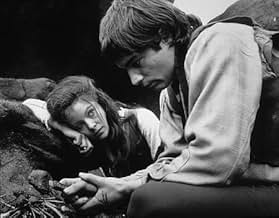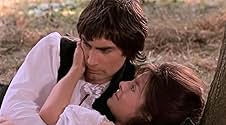NOTE IMDb
6,3/10
2,3 k
MA NOTE
Ajouter une intrigue dans votre langueDoomed lovers Catherine and Heathcliff are torn apart by their own selfishness and hate.Doomed lovers Catherine and Heathcliff are torn apart by their own selfishness and hate.Doomed lovers Catherine and Heathcliff are torn apart by their own selfishness and hate.
- Réalisation
- Scénario
- Casting principal
- Récompenses
- 1 nomination au total
Hilary Heath
- Isabella Linton
- (as Hilary Dwyer)
Avis à la une
This version of Wuthering Heights was pretty much dismissed by the major reviewers back in 1970. Many of those reviewers couldn't get past the American International logo before ridiculing the movie as second rate teen angst. It has been treated more kindly in later years (three stars in Maltin's guide), but the film falls short in several areas. It's true that AIP spent more money on this than they normally did. Even the Corman Poe movies had a lower budget than WH. They hired a few middle level "name actors," primarily Harry Andrews and Pamela Brown (who is in only two scenes). Robert Fuest was not exactly a name director (before or after this) but he had delivered a big hit for AIP in "The Abominable Dr. Phibes." So, this was probably his reward.
I agree that the photography was the film's best asset, and the late John Coquillion, who shot it, went on to a fairly distinguished career, including shooting three Peckinpah films. The decision to film "on location" was also good, and the moors look appropriately bleak.
The major problem for me was not that the movie ends (as the 1939 version did) halfway through the novel, but that the transitions are abrupt and jarring. Now I have only seen it on vhs--the original EMI- HBO tape, not one of the later cheap versions--but I think It was uncut. There is, for instance, an unexplained gap from Cathy's decision to marry Edgar. Suddenly she married him, and his parents are both dead. There was a lame attempt to explain this in a scene of Edgar and Cathy in the graveyard. The sequence of Heathcliff seducing Edgar's sister is trite, as is the "shampoo commercial" ambiance of the love scene between Heathcliff and Cathy.
On the plus side Andrews and Julian Glover (as the adult Hindley) give good performances. I get the feeling that if AIP had been willing to spend a bit more, and maybe rework the script a bit for pace, this could have been a very good film. But as Sam Arkoff was once quoted in an Esquire magazine article about the AIP Beach Party movies, "Sometimes we get some director over here from the majors, and he says 'Sam if I could just have two more days, I could make you a good picture.' The hell with that," Arkoff continued. "We're not 'artsy-fartsy' at AIP!"
I agree that the photography was the film's best asset, and the late John Coquillion, who shot it, went on to a fairly distinguished career, including shooting three Peckinpah films. The decision to film "on location" was also good, and the moors look appropriately bleak.
The major problem for me was not that the movie ends (as the 1939 version did) halfway through the novel, but that the transitions are abrupt and jarring. Now I have only seen it on vhs--the original EMI- HBO tape, not one of the later cheap versions--but I think It was uncut. There is, for instance, an unexplained gap from Cathy's decision to marry Edgar. Suddenly she married him, and his parents are both dead. There was a lame attempt to explain this in a scene of Edgar and Cathy in the graveyard. The sequence of Heathcliff seducing Edgar's sister is trite, as is the "shampoo commercial" ambiance of the love scene between Heathcliff and Cathy.
On the plus side Andrews and Julian Glover (as the adult Hindley) give good performances. I get the feeling that if AIP had been willing to spend a bit more, and maybe rework the script a bit for pace, this could have been a very good film. But as Sam Arkoff was once quoted in an Esquire magazine article about the AIP Beach Party movies, "Sometimes we get some director over here from the majors, and he says 'Sam if I could just have two more days, I could make you a good picture.' The hell with that," Arkoff continued. "We're not 'artsy-fartsy' at AIP!"
My mother had seen this movie in theaters as a girl and, since then, has always commented on how "romantic and secretly sexy" Timothy Dalton and the picture were. I recently saw the film for the first time and could not agree with her more. I was impelled to read the book afterwards and did so in 7.5 hours! I couldn't put it down! The movie was strikingly different from the book but was still wonderful. Dalton and Calder-Marshall shine in their roles. The camera-work is excellent but not even the glorious English moors can distract us from the love of Heathcliff and Cathy. While most likely a "chick flick," this movie is to be enjoyed by all.
This particular rendition of Wuthering Heights is truthfully not as faithful to the novel as it could have been. Yet, I believe that this film expresses the bleary tone of the novel with the most stylistic level of credit. I think that any time a novel is translated into film it loses a certain amount of credibility due to the fact that the mediums of film and literature are interpreted by an audience in very different ways. But having read the novel, I prefer this version to any other that I've seen on film. Heathcliff and Cathy are cast astounding well in the film. Dalton is brooding and flawed without compromising his dark good looks while Calder-Marshall is waifishly emblematic of the heroine of the novel. I only wish that the film had delved more into the novel instead of offering merely of survey of it.
I fell in love with Timothy Dalton the first time I saw this film. Later I fell in love with the film. So much about it was so genuine. Most of all the unbridled passion between Heathcliff and Cathy. As depicted by Dalton and Marshall in this film the passion is so powerful the viewer can believe without doubt that it has the power to tear lovers to shreds. In other versions of Wuthering Heights, for me, it was always questionable. One of my favorite films.
Several people have mentioned the music from this film, and for good reason. This was one of a handful of extraordinary scores by the largely forgotten Michel Legrand (THREE MUSKATEER 1974; SUMMER OF '42, BRIAN'S SONG, among others), and is one of my favorite twenty or so film scores ever. This movie, well-photographed as it was, simply reeks of Gothic atmosphere in great part because of this music. Passionate, sensual, beautiful, and tremendously dramatic, it was even released as a record album in 1970 by the short-lived American International Records Label and, unfortunately, has never been made available on CD. It would be worth a purchase on eBay! I also feel that, while Dalton as Heathcliff is by no means in the same acting league as Sir Laurence Olivier, his passion for Calder-Marshall (who is less effective as Cathy than was Merle Oberon) is nonetheless more urgent and less studied than Oliver's was in the '39 version.
I enjoy the original film for its moody black and white imagery and its fine romantic score (by Alfred Newman, also not available on CD); but, though it's admittedly a lesser film, by a small margin I prefer this 1970 take which, without Legrand's evocative scoring, would probably have been a bust.
I enjoy the original film for its moody black and white imagery and its fine romantic score (by Alfred Newman, also not available on CD); but, though it's admittedly a lesser film, by a small margin I prefer this 1970 take which, without Legrand's evocative scoring, would probably have been a bust.
Le saviez-vous
- AnecdotesThe script drops hints that Heathcliff is really Earnshaw's illegitimate son, either by a mistress or a prostitute, and thus is Cathy's half-brother. While many critics over the years have debated an incestuous subtext in the novel, this was the first film version to be (relatively) open about the issue.
- GaffesIn agony at Cathy's gravesite, Heathcliff pounds his head against a nearby tree. As he runs his fingers down it, it's obvious that the bark is most likely made of rubber.
- Citations
Nellie: It's for God to punish the wicked.
Heathcliff: Why should God have all the satisfaction?
- Crédits fousAfter a funeral scene, the opening credits appear in blue letters on a background of darkened, almost silhouette like, Yorkshire moor landscapes, scenes which appear again later in the film.
- Versions alternativesA video released in the UK in the '80s ran only 80 minutes and was rated 'U', but the 2003 submission was the full 100 minute version and rated 'PG'
- ConnexionsFeatured in The Untold Truth of James Bond (2020)
- Bandes originalesI Was Born in Love With You
(uncredited)
Words by Alan Bergman and Marilyn Bergman
Music by Michel Legrand
Meilleurs choix
Connectez-vous pour évaluer et suivre la liste de favoris afin de recevoir des recommandations personnalisées
- How long is Wuthering Heights?Alimenté par Alexa
Détails
- Date de sortie
- Pays d’origine
- Site officiel
- Langue
- Aussi connu sous le nom de
- Wuthering Heights
- Lieux de tournage
- Société de production
- Voir plus de crédits d'entreprise sur IMDbPro
Contribuer à cette page
Suggérer une modification ou ajouter du contenu manquant

Lacune principale
By what name was Les Hauts de Hurlevent (1970) officially released in India in English?
Répondre

































